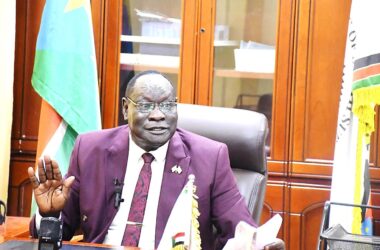
By Kei Emmanuel Duku
The Bank of South Sudan (BoSS) has implemented new, sweeping financial reforms by prohibiting hoarding both local and foreign currency and commodities.
The circular issued yesterday and by BoSS governor Dr. Addis Ababa Othow outlined penalties against people or institutions involved in hoarding of the currency.
The move is designed to stabilize the economy and curb speculative practices that destabilize foreign exchange and goods markets.
According to the directive, any accumulation of foreign currency for speculative or non-productive purposes is strictly banned.
The circular also outlaws transactions conducted outside of authorized banking, forex systems, and official currency exchange agents, including all informal and illegal market dealings.
The circular defines Hoarding as the deliberate accumulation of excessive foreign or local currency outside the banking system with the intent to create artificial scarcity or influence exchange rates.
For commodities, it refers to the deliberate withholding of essential goods, such as gold and other precious metals, to create shortages and manipulate prices.
However, the circular sets a maximum limit of US$1,000, or its equivalent in South Sudan Pounds (SSP), which can be held outside a bank account.
The new rules place significant obligations on financial institutions such as commercial banks, forex Bureau and Cooperatives to ensure full transparency in all foreign exchange transactions, report excess foreign currency holdings to the BoSS weekly, and monitor and report suspicious movements of funds by customers.
The financial Institutions are further directed to maintain proper Know-Your-Customer (KYC) and Anti-Money Laundering (AML) controls and to cooperate fully with BoSS inspectors by providing timely access to records.
Penalties for non-compliance are severe and any individual or entity found in violation will be subject to the seizure and forfeiture of hoarded currency or assets, fines imposed by the BoSS, and the suspension or revocation of licenses for financial institutions.
Meanwhile, accounts associated with hoarding activities will be frozen, and offenders may face criminal prosecution, including imprisonment.
To enforce the circular, the Bank of South Sudan, says it will collaborate with security organs and other government authorities to conduct spot checks, audits, and compliance reviews.
The bank added that through the relevant entities it will also undertake regular market surveillance of forex and commodity markets, investigate and prosecute offenders, and publish sanctions as a deterrent to others.
The bank however called on the public to avoid unauthorized practices and report any known cases of hoarding to the bank or law enforcement agencies.
This circular, which took effect immediately, was issued by Governor Dr. Addis Ababa Othow under the statutory mandate granted by the Bank of South Sudan Act of 2011 (as amended in 2023).
Under the Bank of South Sudan Act-2011 (Amended-2023), it is mandated to maintain monetary and financial stability, ensure price stability, safeguard the value of the South Sudan Pound (SSP), and protect the economic interests of the public.
The directive applies to all licensed financial institutions, currency exchange agents, and individuals involved in currency or commodity trade in South Sudan.



